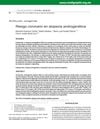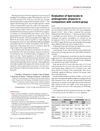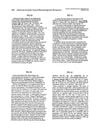 24 citations,
August 2018 in “Journal of Ayurvedic and herbal medicine”
24 citations,
August 2018 in “Journal of Ayurvedic and herbal medicine” Hibiscus rosa-sinensis may help treat various health issues and promote hair growth, but more research is needed for safety.
 146 citations,
December 2016 in “Translational Andrology and Urology”
146 citations,
December 2016 in “Translational Andrology and Urology” Hormone therapy is essential for transgender individuals but requires careful management due to possible metabolic effects.
January 2021 in “Menoufia Medical Journal” People with early-onset androgenetic alopecia may have a higher risk of heart disease due to abnormal blood lipid levels.
 January 2014 in “Revista del Centro Dermatológico Pascua”
January 2014 in “Revista del Centro Dermatológico Pascua” Male pattern baldness is not a risk factor for heart disease based on cholesterol levels alone.
 50 citations,
March 2011 in “European Journal of Endocrinology”
50 citations,
March 2011 in “European Journal of Endocrinology” Spironolactone improved blood vessel function and cholesterol levels in non-obese women with PCOS.
 February 2019 in “Journal of Pakistan Association of Dermatology”
February 2019 in “Journal of Pakistan Association of Dermatology” Many men with male pattern baldness have abnormal blood fat levels, which may raise their risk of heart disease.
 27 citations,
January 2009 in “Journal of The European Academy of Dermatology and Venereology”
27 citations,
January 2009 in “Journal of The European Academy of Dermatology and Venereology” Men with a certain type of hair loss (AGA) have higher bad cholesterol and lower good cholesterol levels, making them more likely to get heart disease.
December 2021 in “Benha Journal of Applied Sciences” Higher Alarin levels may predict androgenetic alopecia and metabolic syndrome.
 18 citations,
December 2010 in “The Journal of Steroid Biochemistry and Molecular Biology”
18 citations,
December 2010 in “The Journal of Steroid Biochemistry and Molecular Biology” Increased HSD11B1 enzyme expression is linked to higher body fat and insulin resistance.
 9 citations,
February 2020 in “International Journal of Endocrinology”
9 citations,
February 2020 in “International Journal of Endocrinology” Some men with early hair loss may have a male version of PCOS, affecting hormones and increasing health risks.
 162 citations,
April 2016 in “The Lancet Diabetes & Endocrinology”
162 citations,
April 2016 in “The Lancet Diabetes & Endocrinology” Testosterone therapy in transgender men has both desired effects like increased muscle mass and potential health risks such as higher cardiovascular risk.
306 citations,
August 2011 in “Journal of cachexia, sarcopenia and muscle” Enobosarm significantly increased muscle mass and improved physical function in elderly men and postmenopausal women without serious side effects.
 5 citations,
February 1996 in “Clinical pharmacology and therapeutics/Clinical pharmacology & therapeutics”
5 citations,
February 1996 in “Clinical pharmacology and therapeutics/Clinical pharmacology & therapeutics” Minoxidil given intravenously caused small changes in diastolic blood pressure and increased heart rate at higher concentrations in patients with high blood pressure.
 10 citations,
March 2015 in “American journal of primatology”
10 citations,
March 2015 in “American journal of primatology” Ingesting Leucaena leucocephala caused hair loss and increased infant mortality in ringtailed lemurs.
 9 citations,
July 2021 in “Frontiers in Pharmacology”
9 citations,
July 2021 in “Frontiers in Pharmacology” Cholesterol-modified siRNAs targeting certain genes increased hair growth in mice.
 8 citations,
April 1990 in “Hormone and Metabolic Research”
8 citations,
April 1990 in “Hormone and Metabolic Research” The medication combination did not affect glucose tolerance but increased some cholesterol levels due to its estrogen component.
 6 citations,
March 2016 in “British Journal of Dermatology”
6 citations,
March 2016 in “British Journal of Dermatology” Low IGF-1 and high HDL cholesterol levels are linked to more hair loss in middle-aged women.
 November 2022 in “The Journal of Clinical Endocrinology and Metabolism”
November 2022 in “The Journal of Clinical Endocrinology and Metabolism” Postmenopausal hyperandrogenism, a condition with symptoms like increased hair growth and acne, is usually caused by PCOS but can also be due to other factors. It's diagnosed by checking testosterone levels and treated either by removing the adrenal tumor or through antiandrogen therapy.
 90 citations,
February 2013 in “The Journal of Clinical Endocrinology and Metabolism”
90 citations,
February 2013 in “The Journal of Clinical Endocrinology and Metabolism” Women with PCOS have more body fat and thicker fat layers in certain abdominal areas than women without PCOS.
5 citations,
February 2021 in “JCPSP. Journal of the College of Physicians & Surgeons Pakistan” Early-onset hair loss in young males is linked to a higher risk of metabolic syndrome.
 116 citations,
April 2002 in “American journal of veterinary research”
116 citations,
April 2002 in “American journal of veterinary research” Trilostane effectively and safely treats dogs with pituitary-dependent hyperadrenocorticism, improving symptoms and adrenal gland size.
 5 citations,
June 2020 in “Experimental dermatology”
5 citations,
June 2020 in “Experimental dermatology” Redheaded people may have evolved to efficiently make vitamin D in areas with less sunlight.
 March 2013 in “Journal of pediatric nursing”
March 2013 in “Journal of pediatric nursing” The case emphasizes the need for careful screening in children for insulin resistance and related conditions.
 36 citations,
November 1995 in “Clinical endocrinology”
36 citations,
November 1995 in “Clinical endocrinology” Low-dose flutamide helps reduce excessive hair growth and is even more effective with birth control, without bad effects on blood fats.
 12 citations,
February 2022 in “International Journal of Clinical Practice”
12 citations,
February 2022 in “International Journal of Clinical Practice” Oxidative stress is higher in women with PCOS, especially if they're obese, and it may increase their risk of heart disease.
 2 citations,
September 2020
2 citations,
September 2020 Long-term high testosterone levels can improve bone density and reduce body fat but may increase the risk of prostate cancer and high blood pressure.
 May 2023 in “Research Square (Research Square)”
May 2023 in “Research Square (Research Square)” Agaricus subrufescens extract improved ovarian function and normalized various health markers in rats with PCOS.
 November 2024 in “Frontiers in Endocrinology”
November 2024 in “Frontiers in Endocrinology” Hair analysis can help diagnose adrenal disorders non-invasively.
 3 citations,
August 2021 in “The Open Dermatology Journal”
3 citations,
August 2021 in “The Open Dermatology Journal” The herbal hair serum improves hair quality and growth, and is a good alternative to traditional cosmetics because it doesn't contain harmful chemicals like parabens and sulphates.
 1 citations,
November 2017 in “International journal of clinical endocrinology and metabolism”
1 citations,
November 2017 in “International journal of clinical endocrinology and metabolism” The supplement with Myo-inositol and D-chiro-inositol improves metabolic symptoms in PCOS, especially when combined with metformin.


























